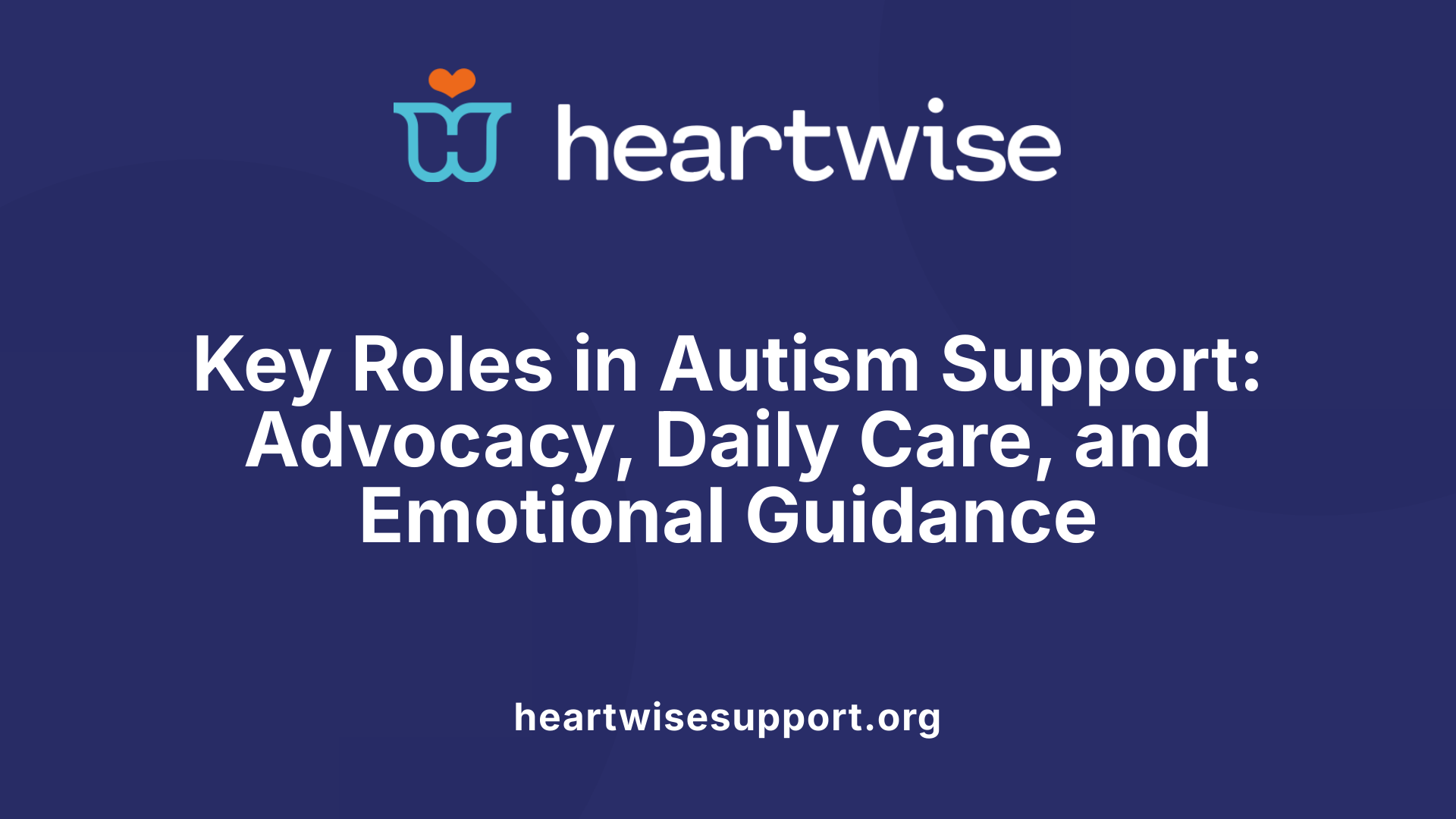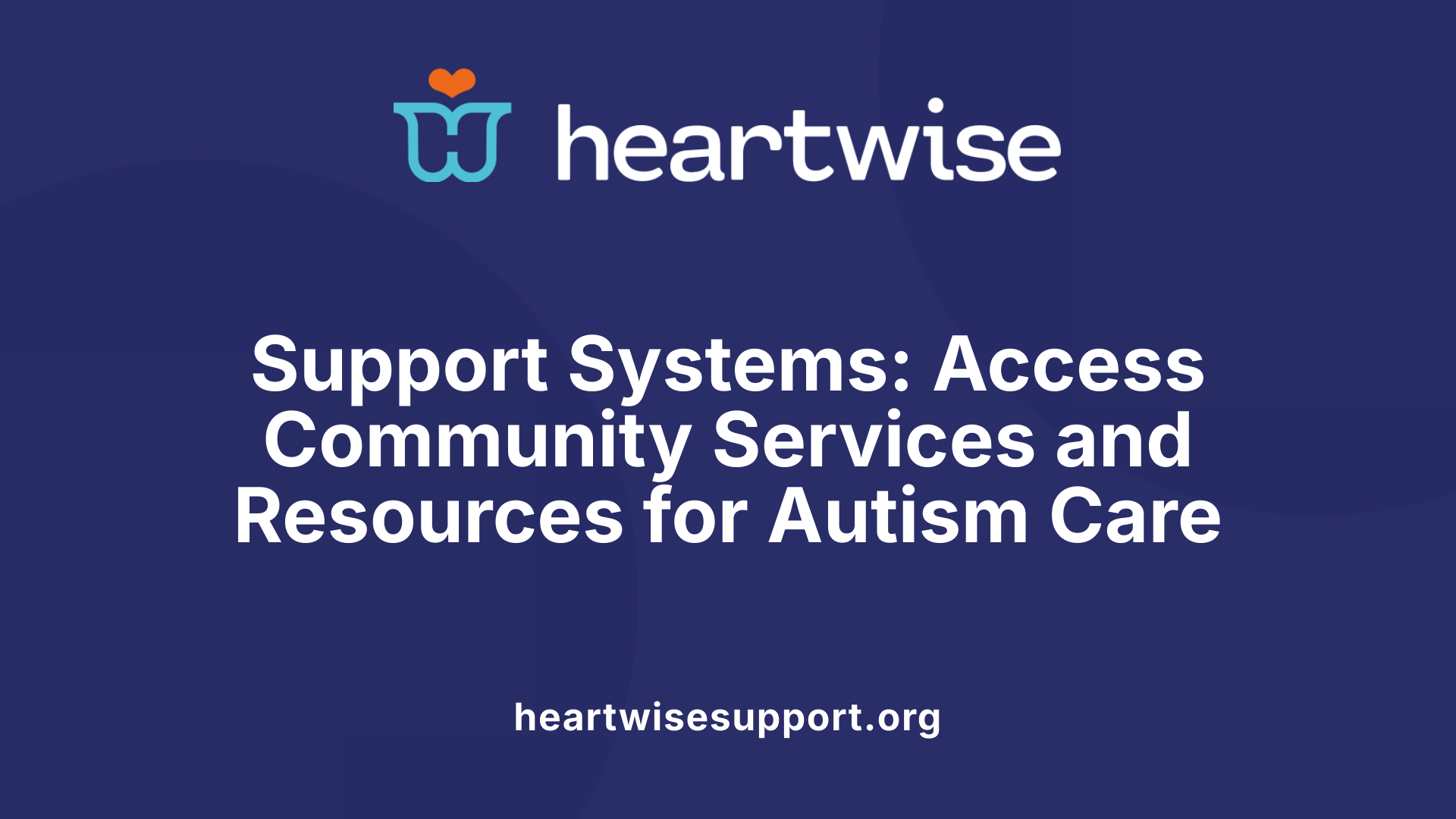Understanding the Vital Role of Caregivers in Supporting Autistic Individuals
Caregivers are the backbone of support for individuals with autism spectrum disorder (ASD), playing multifaceted roles that influence development, well-being, and quality of life. This article explores the essential responsibilities, challenges, and strategies caregivers employ, emphasizing the importance of self-care and available services to sustain their vital contributions.
Roles and Responsibilities of Caregivers in Autism Support

What are the roles and responsibilities of caregivers in supporting autistic individuals?
Caregivers play a vital role in the daily lives of individuals with autism. Their responsibilities include coordinating medical appointments, therapies, and educational services to ensure comprehensive support tailored to the individual's needs.
One of the primary duties is supporting daily living activities. This involves assisting with essential tasks such as feeding, bathing, dressing, maintaining hygiene, and toileting. These activities are fundamental in fostering independence and ensuring the individual's comfort and health.
In addition, caregivers provide emotional and social support. Creating a stable environment helps improve mental well-being and encourages positive social interactions. They act as advocates, managing invisible supports like emotional guidance and behavioral strategies to promote development.
Understanding the unique needs of each person is crucial. This involves considering factors such as the severity of autism and developmental stage, which influence what specific supports and interventions are appropriate.
Overall, the role of caregivers extends beyond physical care. They coordinate services, support daily routines, and provide emotional sustenance, all of which are essential in helping individuals with autism thrive.
The Significance of Self-Care for Caregivers

Why is self-care essential for caregivers of autistic individuals?
Caring for someone with autism involves emotional, physical, and psychological demands that can quickly lead to burnout if caregivers neglect their own needs. Prioritizing self-care helps prevent this burnout, allowing caregivers to sustain their energy and mental health over the long term.
Taking time for oneself supports stress management and enhances overall well-being. When caregivers engage in activities that bring joy or relaxation, such as hobbies or social outings, they replenish their emotional reserves, making it easier to stay patient and present.
Furthermore, setting boundaries around caregiving responsibilities and practicing self-compassion are vital. Boundaries help prevent overwhelm, while self-compassion fosters a healthier perspective, reducing guilt often associated with taking personal breaks.
Building resilience goes hand-in-hand with routine maintenance and purpose. Routine activities provide structure, giving caregivers a sense of control and stability. Engaging in meaningful pursuits not only boosts mood but also fortifies coping strategies.
In family settings, modeling healthy behaviors through self-care encourages other members to prioritize their own needs, fostering a supportive environment.
Ultimately, sustained self-care ensures caregivers are empowered to support their loved ones effectively while safeguarding their own health. Consistent self-care practices lead to better family dynamics, improved caregiver well-being, and positive role modeling for children.
How do self-care strategies benefit caregivers?
| Strategy | Benefits | Additional Notes |
|---|---|---|
| Preventing burnout and managing stress | Maintains mental health, boosts patience | Regular breaks, mindfulness exercises |
| Engaging in hobbies and social activities | Emotional replenishment, social connection | Dancing, reading, or community events |
| Setting boundaries and practicing self-compassion | Reduces overwhelm, builds resilience | Saying no, positive self-talk |
| Building resilience through purpose and routine | Provides stability, enhances coping | Scheduling daily routines, goals |
| Modeling healthy behaviors within the family | Promotes a supportive family atmosphere | Demonstrating self-care, open communication |
What is the importance of self-care for caregivers of autistic individuals?
Self-care is critically important for caregivers of autistic individuals because it helps prevent burnout, reduce stress, and maintain their mental and physical health. By prioritizing activities such as setting boundaries, finding purpose, and engaging in hobbies, caregivers can replenish their emotional resources and build resilience. Effective self-care also enables caregivers to stay patient, focused, and present, which positively impacts the quality of support they provide to autistic individuals. Additionally, practicing self-care fosters stronger relationships, prevents feelings of isolation, and models healthy behaviors within the family. Ultimately, sustained self-care ensures caregivers are better equipped to meet their loved ones' needs while maintaining their own well-being.
Available Services and Resources for Caregivers
 Supporting caregivers of individuals with autism involves a wide range of services designed to alleviate stress and promote well-being. Respite care offers temporary relief by providing professional or community-based assistance with daily tasks, enabling caregivers to rest and focus on their health. Counseling and support groups are also invaluable, offering emotional support, shared experiences, and practical advice.
Supporting caregivers of individuals with autism involves a wide range of services designed to alleviate stress and promote well-being. Respite care offers temporary relief by providing professional or community-based assistance with daily tasks, enabling caregivers to rest and focus on their health. Counseling and support groups are also invaluable, offering emotional support, shared experiences, and practical advice.
Community programs are established to assist with everyday responsibilities such as transportation, household chores, and personal care. These programs help families manage the demands of caring for someone with autism and foster community integration.
Lifelong supports extend to residential placements, day programs, recreational activities, and social clubs that promote independence and social skills. Access to these services varies depending on geographic location and funding availability.
Organizations such as Autism Speaks, the Autism Society, and local agencies provide extensive resources, including information centers, helplines, and advocacy support. They facilitate connection to local services and offer guidance on navigating complex systems.
Tools like the 100 Day Kit assist newly diagnosed families by providing step-by-step guidance in understanding autism, accessing funding, and planning interventions. Moreover, online platforms and research initiatives offer additional avenues for families to learn, connect, and participate in advocacy efforts.
In-home care services focus on daily tasks such as dressing, hygiene, and behavioral support, tailored to individual needs. Behavioral therapy and career coaching support progress and independence, ensuring a comprehensive approach to lifelong development.
Overall, these services and resources aim to empower caregivers, support the development of individuals with autism, and foster resilient family systems.
Impact on Development and Quality of Life
How do caregivers impact the development and quality of life of autistic individuals?
Caregivers play a vital role in shaping the development and overall well-being of autistic individuals. By providing consistent guidance, emotional support, and a stable environment, they directly influence the child's social, emotional, and daily functioning.
This support fosters learning new skills, managing behavioral challenges, and building confidence. For example, routine and predictability—established through caregiver effort—help autistic people navigate daily life more effectively.
However, caring for individuals with autism can also be demanding. Caregivers often experience high levels of stress and burnout, especially when caring for those with severe symptoms or managing late diagnoses. This stress can diminish their mental and physical health, which in turn lessens their capacity to support their loved ones.
When caregiver strain is high, it may result in decreased patience, emotional availability, and consistency, affecting the child's development.
Research shows that supporting caregiver well-being through interventions—such as emotional support programs, respite care, and social networks—can significantly improve outcomes. These resources help reduce stress, bolster resilience, and enable caregivers to provide more effective support.
In summary, caregiver health and well-being are closely tied to the development and life quality of autistic individuals. Ensuring caregivers have access to support enhances the positive impact they have on the growth, independence, and emotional stability of those with autism.
Strategies for Effective Caregiving Across Ages
What are effective strategies for caregiving across different age groups of autistic individuals?
Providing effective support to autistic individuals at various life stages requires an adaptable and personalized approach. It is important to consider the developmental, emotional, social, and communication needs of the individual.
For young children, establishing consistent routines and applying early intervention therapies such as behavioral and speech therapies can create a strong foundation. These therapies are most effective when caregivers are trained in evidence-based practices like caregiver-mediated interventions and naturalistic developmental behavioral strategies.
During adolescence and adulthood, promoting independence becomes more central. Caregivers can support emotional and social needs by encouraging participation in community activities, fostering self-advocacy, and respecting sensory preferences. Supporting ongoing skill development through tailored educational programs and occupational therapy can help build functional independence.
Building caregiver skills through education and training is vital across all ages. Caregivers should learn how to implement strategies that are developmentally appropriate, manage behavioral challenges, and effectively use supportive tools and routines.
Supporting emotional and communication needs is a continuous process. This might involve using assistive technology, visual aids, or tailored communication methods that respect each individual's unique preferences and abilities.
Promoting independence and meaningful participation in everyday activities is essential. Strategies such as structured routines, environmental modifications, and community engagement help autistic individuals thrive and achieve increased autonomy.
Throughout the caregiving journey, the mental health of caregivers must be prioritized. Stress management techniques, self-care practices, and access to support networks like parent groups and professional services are crucial for maintaining effective caregiving.
Overall, adopting a family-inclusive, culturally sensitive, and person-centered approach ensures that caregiving adapts to changing needs and supports the best possible quality of life for autistic individuals across all ages.
Theoretical Frameworks and Cross-Cultural Considerations
How do ecological approaches and family systems theory enhance our understanding of caregiving impacts?
Ecological approaches and family systems theory are widely used to examine how caring for someone with autism affects families. Ecological models view caregiving within the context of interactions between family, community, and societal environments. They highlight how external factors like social support, policies, and community resources influence caregiver stress and family functioning.
Family systems theory focuses on the family as an interconnected unit, emphasizing how each member's behaviors and emotional health impact others. This perspective helps explain why caregiving challenges are not isolated but ripple through family relationships, affecting overall family well-being and resilience.
Together, these frameworks provide a comprehensive understanding of the multifaceted nature of caregiving, illustrating how individual, family, and societal factors intertwine.
Why is understanding cultural influences on caregiving important?
Cultural beliefs and norms significantly shape how families perceive autism and caregiving roles. Cultural context influences attitudes toward diagnosis, acceptance, and the types of support families seek.
However, most research on autism caregiving has been conducted in Western societies, revealing a gap in cross-cultural perspectives. Non-Western societies may have different perceptions and stigma associated with autism, affecting access to services and family dynamics.
Recognizing these cultural differences is crucial for developing effective, culturally sensitive support programs. It helps ensure that interventions respect family values and social norms, ultimately improving their effectiveness.
Understanding the complex influences of culture and environment allows clinicians, policymakers, and support organizations to tailor their approaches to diverse family needs, promoting more inclusive and accessible caregiving support systems.
Conclusion: Supporting Caregivers for Better Outcomes
Supporting caregivers of individuals with autism is vital for the well-being of both the caregiver and the individual. Ongoing resources such as community support groups, respite care services, and accessible information resources play a critical role in helping caregivers manage stress and prevent burnout. These supports enable caregivers to maintain their health and effectively advocate for their loved ones.
Advocating for policy changes and increased funding is essential to improve access to services, early intervention programs, and educational supports. Policies that include caregiver-friendly workplace arrangements, financial assistance, and inclusive education practices can significantly ease the caregiving burden.
Enhancing caregiver training and education, through parent training programs and collaboration with schools and healthcare providers, empowers families with skills to better support their children. Such programs foster confidence, improve intervention strategies, and promote positive outcomes.
Promoting resilience and prioritizing mental health support for caregivers ensures they can sustain their caregiving roles. Regular emotional support, building social connections, and encouraging self-care improve overall well-being, facilitating better care for individuals with autism.
Empowering Caregivers for Long-term Success in Autism Support
Supporting caregivers through accessible resources, effective interventions, and policy advocacy is essential to improve both caregiver well-being and the developmental outcomes of autistic individuals. Building resilient, informed, and supported caregiving communities ensures that individuals with autism can thrive with the guidance and care of dedicated caregivers.
References
- Understanding Different Aspects of Caregiving for Individuals with ...
- Caring for the caregiver | Autism Speaks
- Autism Care at Home: What Families Should Know
- Roles of Caregivers of Autistic Adults: A Qualitative Study
- Caregivers of Children with Autism Spectrum Disorders: The Role of ...
- The Critical Role of a Caregiver in Navigating Systems of Care
- [PDF] Understanding caregivers' needs: supporting families of autistic ...
- The Role of Parents and Caregivers to an Autistic Child
- Understanding and Supporting Autism in Adulthood: Practical Tips ...
- The Role of Parents and Caregivers in Autism Support











